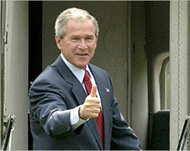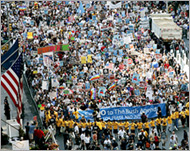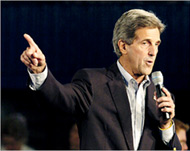Fewer Americans choosing to vote
Although the United States often bills itself as the world’s greatest democracy, voter turnout has consistently fallen through the years and nearly half of the American electorate chose not to vote in the 2000 presidential election.

With few exceptions, US voter turnout has declined significantly since 1960 as more Americans have disengaged from the political process.
In fact, a smaller number of citizens vote in the US than in almost any western democratic nation.
Political experts say a wide range of factors have contributed to the drop in voter participation, including the frequency of elections, the mobility of many citizens and the notion that younger voters no longer feel a strong sense of civic duty.
There is also the common perception that many Americans no longer care enough to vote, awash in a new-found age of cynicism and mistrust of government.
Disenchanted
“The overall sense is that people have become disenchanted somewhat with the political process,” said Charles Jones, an expert on presidential elections at the Brookings Institution, a Washington thinktank.
|
“Nobody believes that they’re going to make a difference” Raymond Wolfinger, |
As money, television advertising and corporate lobbying have gradually come to dominate the presidential campaign trail, fewer voters feel their voices can be heard through the whisper of a single vote, said Raymond Wolfinger, political science professor at the University of California, Berkeley, who is writing a book on voter turnout.
“Nobody believes that they’re going to make a difference,” he said.
Nevertheless, few scholars attribute low voter turnout to political cynicism. No study, they say, has ever shown a definitive correlation between cynical Americans and their likelihood not to vote.
“Some cynical people vote and some don’t,” Wolfinger said.
Italy, which boasts one of the highest voter turnout rates of any Western country, also has one of the most cynical populations when it comes to government, according to Robert Putnam, professor of public policy at Harvard University.
The real reason behind the trend of voter apathy in America is far more complicated and fragmentary, many scholars say.
Mobility factor
The mobility of the American voter is one factor, both Putnam and Wolfinger said. For many Americans, moving from one home, city or state to another is not an uncommon practice. But it often means they must re-register to vote under a new address, depending on the election laws of a particular state.
 |
|
Bush took office amid a voting |
“People who move around a lot generally vote less,” Putnam said.
But while a US Census Bureau survey reported that just over 67% of registered voters went to the polls in the 2000 presidential election, Wolfinger said that figure was too low.
“The proportion of Americans who vote is between 85-90% in presidential elections,” he said.
Burnout factor
Voter mobility is only one piece of a much larger puzzle. The frequency by which US citizens are asked to vote in local, state and federal elections can overwhelm many potential voters and dilute the electoral process, Putnam said.
Whereas a parliamentary system such as the one in Britain only has two major elections every four years, Americans “could vote 30 or 40 times” every four years, he said.
“It just becomes a battle of too many elections,” he said.
There is also a feeling among some experts that today’s younger citizens do not feel the “obligation to vote” that many voters from previous generations experienced.
Generation factor
Whereas the Great Depression and the second world war inculcated a generation of young people with the importance of civic responsibility and self-sacrifice, the MTV youth culture lacks the same mentality of its forbearers, Putnam said.
|
“One long-term effect of 9/11 could be a political reawakening among young people” Robert Putnam, |
“That’s a big difference between the younger generation and your grandparents’ generation,” he said. “Young people today are way less likely to vote than young people were a generation or two ago.”
While the 11 September 2001 attacks on the US were for today’s younger generation “the same experience that their grandparents had after [the Japanese attack on] Pearl Harbor”, it remains to be seen whether 9/11 will have a long-term impact on civic consciousness, Putnam said.
“One long-term effect of 9/11 could be a political reawakening among young people,” he said.
Social factor
It may also be true that in the age of television, music videos and modern technological entertainment, many Americans are simply too distracted to heavily engage in politics and other forms of civic life, said John Judis, a visiting scholar at the Carnegie Endowment for International Peace.
Judis noted that voter turnout in America was much higher in the 19th century, when for many people political campaigns were as much about recreation as anything else.
 |
|
Active participants like these anti- |
“[Political events] were major entertainment events,” Judis said. “People used to go hear speeches like we would go to a rock concert.”
Conversely, this day and age finds many Americans increasingly withdrawn from various forms of social interaction, including politics, some experts say.
In his 2000 book, Bowling Alone, Putnam documented what he called America’s plummeting “social capital”, the decreasing participation of citizens in social networks ranging from neighbourhood watch programmes and church groups to political party meetings.
As Americans have become further disengaged from social networks both large and small, the number of people drawn to the voting booth has inevitably decreased, he said.
“People who go to church are more likely to vote,” he said. “People who belong to civic groups are more likely to vote. These things make us more proactive and less passive.”
Money factor
Of course there is always the money factor as well.
Although some scholars dismiss the theory that there is a nexus between the massive infusion of cash into today’s presidential campaigns and low voter turnout, others suggest that the disparity of wealth in America is having an adverse impact on the political process.
 |
|
Analysts say more voters may |
A new study conducted by the American Political Science Association titled American Democracy in an Age of Rising Inequality, reported that America increasingly is comprised of two “classes of citizenship” in which the affluent sector has far more access to political leaders than the low-income sector.
The report said the two major political parties spend most of their time “recruiting” assistance from those “who are already the most privileged and involved”, and that the economic imbalances in the US are becoming more severe than in most other democratic countries.
These developments have most likely dissuaded some poorer American citizens from joining the political system, the report said.
“What we are witnessing now is not only low voter participation among the disenfranchised in this country,” said Lawrence Jacobs, one of the authors of the report. “There is also a growing sense of powerlessness that is tearing at the heart of democracy itself.”
Hope
Despite such problems, several analysts say they expect a larger turnout this year, in part due to the controversy surrounding the 2000 election but also because of the added weight of the post-9/11 “war on terrorism”.
“I actually think it’s quite possible that voter turnout will go up this election,” Putnam said.
Unlike some presidential elections of years past, many experts believe the clearly-defined issues at stake and the political tension between Republicans and Democrats will draw more voters to the polls this November.
“This year both sides are highly motivated,” Jones said. “There seem to be big differences between the parties.”